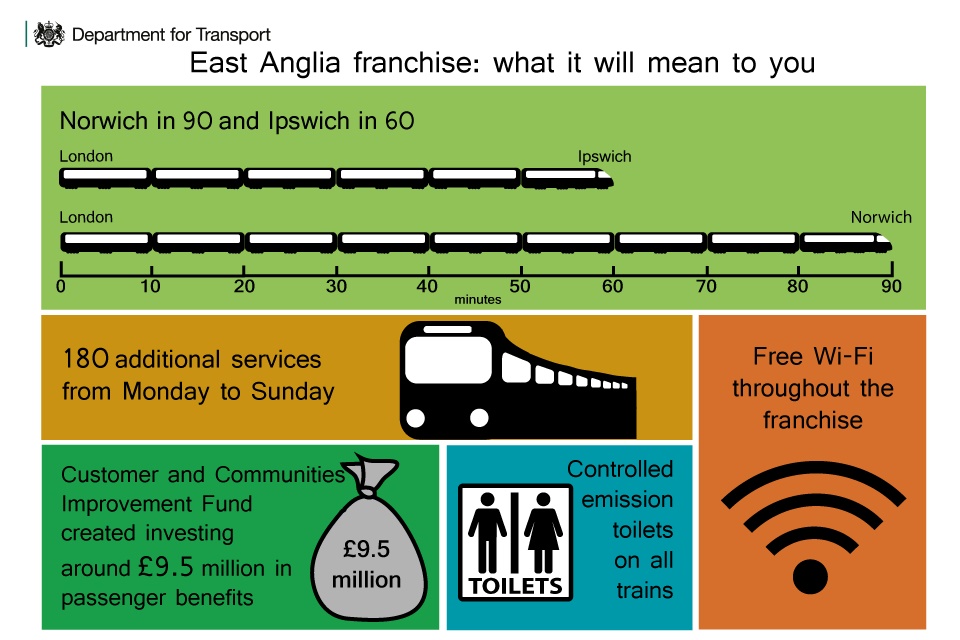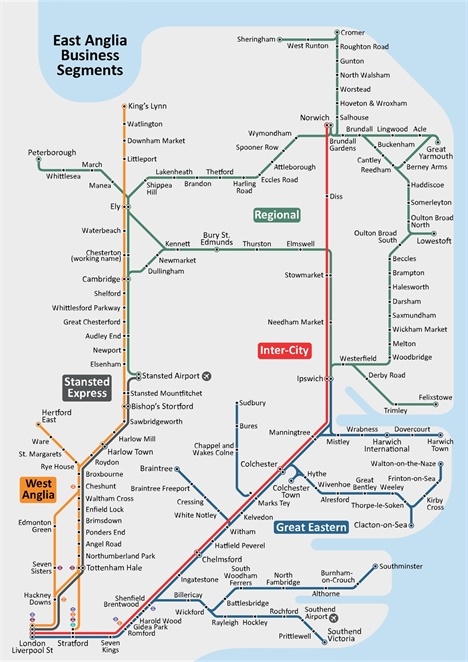17.09.15
Next East Anglia TOC must slash travel times and improve rolling stock
The operator of the next nine-year East Anglia franchise will have to introduce at least two 90-minute services in each direction running between Norwich and London every weekday, alongside a series of mandatory upgrades revealed today in invitation to tender (ITT) documents.
The new franchisee must also introduce at least one service in each direction running between Ipswich and London that has a journey time of less than 60 minutes.
These headline journey time reductions were a ‘key recommendation’ of the Great Eastern Main Line Taskforce, which had been pressing for ‘Norwich in 90’.

The New Anglia Local Enterprise Partnership (LEP) for Norfolk and Suffolk welcomed the ITT publication as a “next step” in their Great Eastern Rail Campaign, which has campaigned for infrastructure improvements to increase speed and capacity in the route since 2012.
Taskforce co-chairs Mark Pendlington (chair of the LEP) and Chloe Smith MP said: “We have secured agreement at every level to new trains and track upgrades, which together will allow for ‘Norwich in 90’, ‘Ipswich in 60’, and benefits along the line. The day-to-day and economic benefits of what we have won will be immense for our region and completed in 10 years.
“As promised, the [publication] lays out the expectation of new trains, together with how this will be achieved commercially. In the short term, we also welcome the provision of additional fast services from Norwich and Ipswich to London. In the long term, our work continues to make sure the necessary track improvements take place over the next 10 years, as planned.”
As well as slashing journey times, the operator will have to introduce 180 extra seven-day services to stations including Cambridge, Norwich, Stansted Airport, Southend and London Liverpool Street.
Their bid must also include “dramatic” improvements of the quality of trains running on the East Anglia network, with a special focus given to deals planning to trial new rolling stock technologies.
 East Anglia franchise 2015 map. (Source: Rail Executive. Contains public sector information licensed under the Open Government Licence v3.0.)
East Anglia franchise 2015 map. (Source: Rail Executive. Contains public sector information licensed under the Open Government Licence v3.0.)
The ITT documents were published today (17 September) ahead of the contract award in June 2016. Operators have until 17 December to provide their bids for the franchise, which is set to start on October 2016.
The documents specify that, because rolling stock currently running on the route is “too old and unreliable”, the ITT will particularly focus on the quality of new trains.
Improved rolling stock must be of a high quality and fit for purpose, such as by providing wi-fi and controlled emission toilets, as well as tackle crowding levels.
The government also expects new trains to be rolled out in the route, but did not specify this because they want bidders to “price their options competitively”.
Station improvements are also an essential part of the bid, with bidders expected to “invest heavily” in them.
The three shortlisted bidders for the franchise are First Group, National Express, and a joint venture between incumbent operator Abellio and Stagecoach.
The rail minister, Claire Perry MP, said: “For too long, passengers in East Anglia have not had the high-quality rail services that they deserve. Our ambitious requirements will change that by making journeys significantly better than they are now. These plans will also ensure that East Anglia has a rail network that supports its growing economy.
“We have set out what we want to see bidders deliver as a minimum, but we are looking for bids that exceed our expectations wherever possible. It is now for the industry to step up to the challenge and tell us how they will make this happen.”
Other required improvements include the creation of a £9.5m ‘customer and communities improvement fund’ benefit passengers and the local community.
The government will also directly set “challenging” customer service targets, monitoring the operator’s progress with mystery shoppers and surveys – in which “clear year-on-year” improvements will be expected to shine through. The TOC will be financially penalised if targets are not met.
This will depart from the current model of customer service, where East Anglia operators are able to set their own targets for service and then report back to the government.